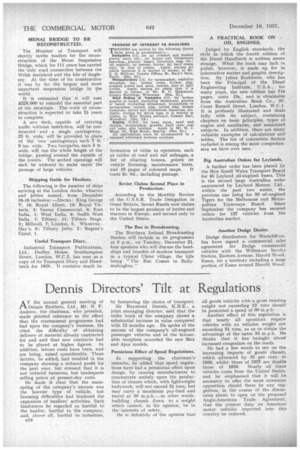Dennis Directors' Tilt at Regulations
Page 6

If you've noticed an error in this article please click here to report it so we can fix it.
AT the annual general meeting of Dennis Brothers, Ltd., Mr. N. P. Andrew, the chairman, who presided, made pointed reference to the effect that the rearmament programme had had upon the company's business. He cited the difficulty of obtaining delivery of material already contracted for and said that new contracts had to be placed at higher figures. In addition, labour costs have been, and are being. raised considerably. These factors, he added, had resulted in the company showing a reduced profit for the past year, but stressed that it is not reduced turnover, but inadequate selling prices at present-day costs.
He made it clear that the mainspring of the company's success was the heavier type of vehicle, but licensing difficulties had hindered the expansion of hauliers' activities. Such hindrances he regarded as hurtful to the haulier, hurtful to the company, and, above all, hurtful to industries, rs24 by hampering the choice of transport. Sir Raymond Dennis, K.B.E., a joint managing director, said that the order book of the company shows a substantial increase in value compared with 12 months ago. He spoke of the success of the company's oil-engined passenger vehicles and of the favourable reception accorded the new Max and Ajax models.
Pernicious Effect of Speed Regulations.
In supporting the chairman's remarks, he added that speed regulations have had a pernicious effect upon design, by causing manufacturers to concentrate unduly upon the production of chassis which, with lightweight bodywork, will not exceed 21 tons, but may carry a maximum pay-load and travel at 30 m.p.h—in other words, building chassis down to a weight which cannot, in his opinion, be in the interests of safety.
He is definitely of the opinion that
all goods vehicles with .a gross running weight not exceeding 12 tons should be permitted a speed of 30 -m.p.h.
Another effect of this regulation is that nearly all operators require vehicles with an unladen weight not exceeding 2A tons, so as to obtain the advantage of the extra 10 m.p.h. He thinks that it has brought about increased congestion on the roads.
He had a few words to say on the increasing imports of goods chassis, which advanced by 35 per cent. in 1936, whilst those of 1937 are double those of 1936. Nearly all these vehicles come from the United States, and he emphasized that it will be necessary to offer the most strenuous opposition should there be any suggestion, in the course of the discussions about to open on the proposed Anglo:American Trade Agreement, that the present duty on American motor vehicles imported into this Country be reduced.




























